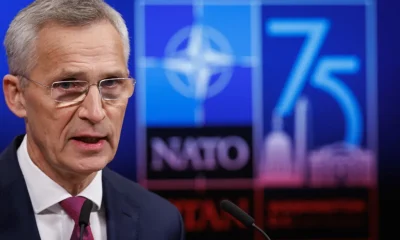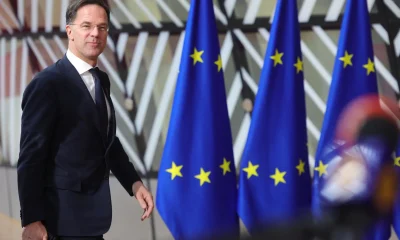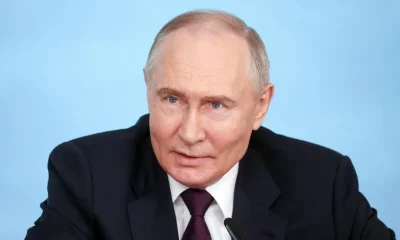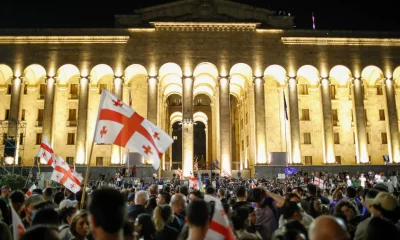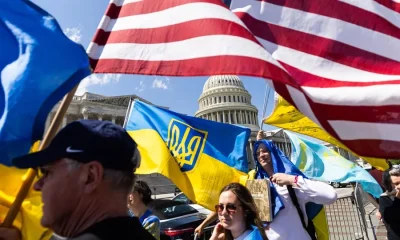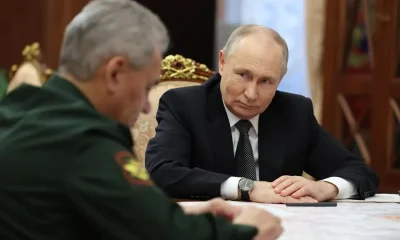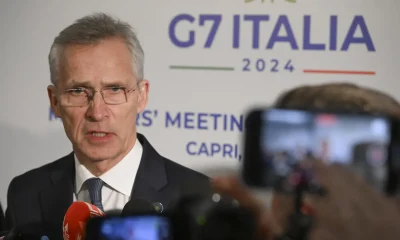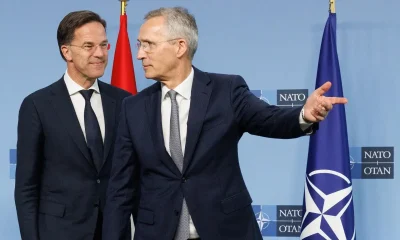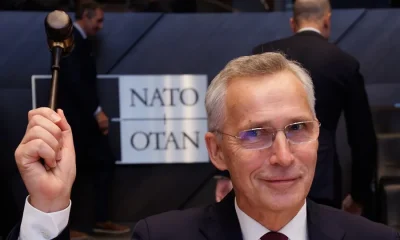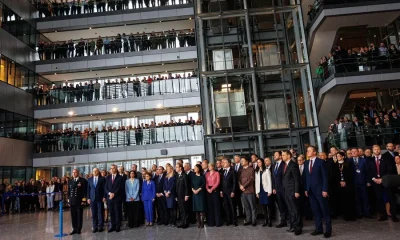International
NATO is finalising more support for Ukraine at its summit as Russia intensifies its attacks
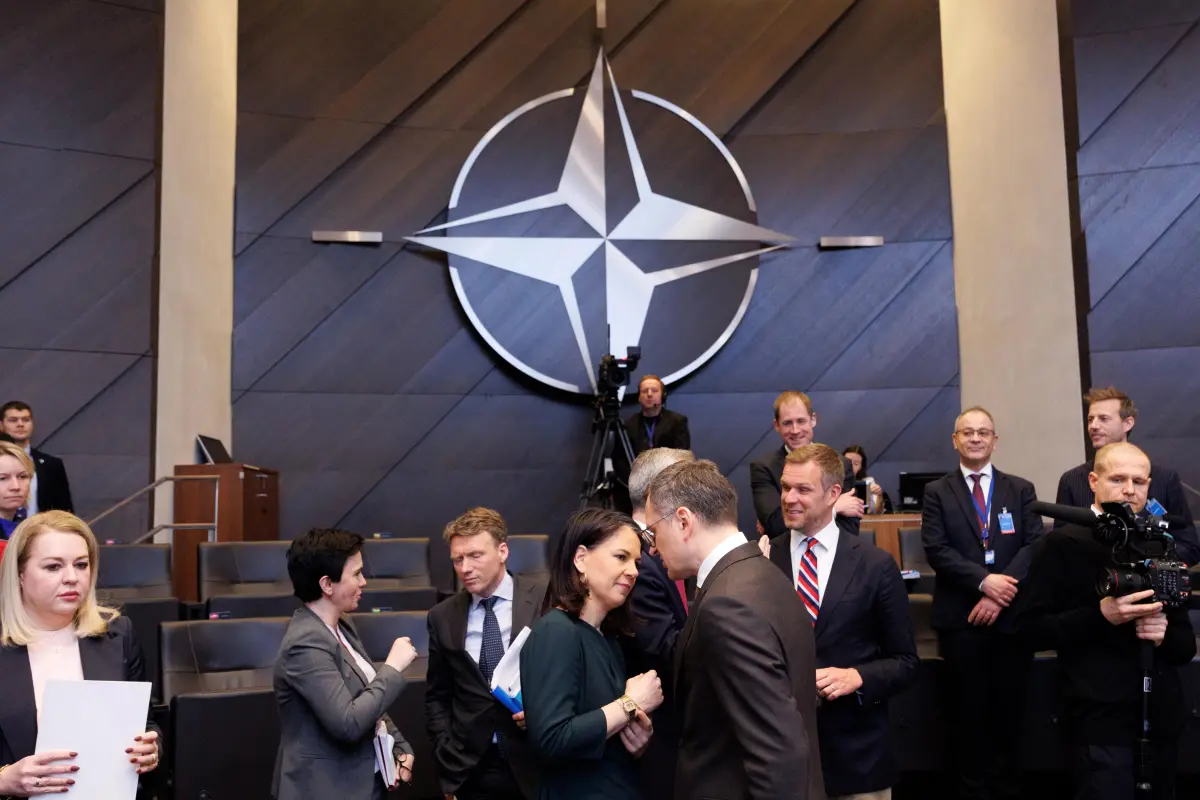
NATO is finalizing the preparations for the summit that will begin in Washington with a commemoration of the 75th anniversary of the Alliance, in which it will reaffirm its long-term support for Ukraine at a time when Russia has intensified its attacks against Ukrainian civilian targets.
“In Ukraine, Russia continues its brutal war. Just today we have seen horrendous missile attacks against Ukrainian cities, killing innocent civilians, including children. I condemn these atrocious attacks,” said the Secretary General of the Alliance, Jens Stoltenberg, in a statement with the US Secretary of Defense, Lloyd Austin.
The Norwegian politician spoke from the US capital about the latest Russian missile attacks against Ukraine, which affected a pediatric hospital and left at least 32 dead, including children.
He made it clear that Russia cannot expect NATO to abandon Ukraine but that “it will have to sit down and accept a solution in which Ukraine prevails as a sovereign and independent nation.”
In that line, the heads of state and government of the 32 allies will support a new comprehensive support package for Ukraine that, in the words of the US ambassador to NATO, Julianne Smith, “will help Ukraine to modernize its forces, create a force for the future, work on aspects such as interoperability with the Alliance and continue to transform its Army.”
“We are building a bridge to bring Ukraine closer to NATO membership,” Smith said on the American public radio NPR.
An entry that the allies agree that it will happen when the country is ready, although at this summit they will continue to not specify a date for it.
The allies are expected to approve an aid package for Ukraine that includes a leading role of NATO in the management of international arms contributions for the invaded country, the training of its soldiers and a fund of about 40 billion euros to pay for the military equipment that Kiev needs to defend itself.
They will also address their most pressing needs on the battlefield, especially those related to anti-aircraft defenses and artillery ammunition.
The president of the United States. Joe Biden will host a ceremony on Tuesday night in the Andrew W auditorium. Mellon to celebrate the 75th anniversary of the North Atlantic Treaty, foundation of the Alliance, which was signed in that same place on April 4, 1949.
Biden will host this summit at a time of doubts about his ability due to his age to be the Democratic candidate in the November presidential elections after his weak performance in the recent debate with the Republican candidate, Donald Trump.
The White House denied on Monday that there is concern among NATO countries about Biden’s political future.
“We are not perceiving any signs about it in the previous conversations we have with them. Rather the opposite. They are enthusiastic about this summit, about the possibilities and actions that we will undertake together, specifically to help Ukraine,” said one of the spokesmen of the White House, John Kirby.
On Wednesday, the allied leaders will hold a first working session in which they hope to approve the summit declaration, focused on underpinning lasting support for Ukraine, strengthening the policy of deterrence and defense and deepening relations with Pacific partners in the face of the challenges posed by China.
On Thursday, a NATO-Ukraine Council will take place where the Ukrainian president, Volodymyr Zelenski, will participate, and a session with the partners of the Pacific (Japan, South Korea, Australia and New Zealand) and the European Union.
NATO is convinced that its security “is not regional, but global,” as Stoltenberg said on Monday, that Iran, North Korea and China are “supporting and allowing Russia’s illegal war of aggression against Ukraine.”
To comply with NATO’s 360-degree defense strategy, leaders plan to approve a new strategy to pay more attention to the challenges (migration waves, political instability), but also to opportunities from the countries of the Southern Neighbourhood of the Alliance, from the Middle East to the Gulf of Guinea.
In order to face these challenges, the allies will reaffirm their commitment to invest at least 2% of their GDP in military spending. Up to 23 allies already invest that figure, while ten years ago, when they set that goal, there were only three.
International
U.S. Senate Rejects Budget, Bringing Government Closer to Shutdown Amid DHS Dispute

The U.S. Senate voted on Thursday against a budget proposal in a move aimed at pressuring changes at the Department of Homeland Security (DHS), following the killing of two civilians during a deployment of immigration agents in Minneapolis.
All Senate Democrats and seven Republican lawmakers voted against the bill, which requires 60 votes to advance, pushing the country closer to a partial government shutdown that would cut funding for several agencies, including the Pentagon and the Department of Health.
The rejection came as Senate leaders and the White House continue negotiations on a separate funding package for DHS that would allow reforms to the agency. Proposed measures include banning Immigration and Customs Enforcement (ICE) agents from wearing face coverings and requiring them to use body-worn cameras during operations.
The vote took place just hours after President Donald Trump said he was “close” to reaching an agreement with Democrats and did not believe the federal government would face another shutdown, following last year’s record stoppage.
“I don’t think the Democrats want a shutdown either, so we’ll work in a bipartisan way to avoid it. Hopefully, there will be no government shutdown. We’re working on that right now,” Trump said during a Cabinet meeting at the White House.
International
Trump Says Putin Agreed to One-Week Halt in Attacks on Ukraine Amid Extreme Cold

U.S. President Donald Trump said on Thursday that he secured a commitment from Russian President Vladimir Putinto halt attacks against Ukraine for one week, citing extreme weather conditions affecting the region.
“Because of the extreme cold (…) I personally asked Putin not to attack Kyiv or other cities and towns for a week. And he agreed. He was very pleasant,” Trump said during a Cabinet meeting broadcast by the White House.
Trump acknowledged that several advisers had questioned the decision to make the call.
“A lot of people told me not to waste the call because they wouldn’t agree. And he accepted. And we’re very happy they did, because they don’t need missiles hitting their towns and cities,” the president said.
According to Trump, Ukrainian authorities reacted with surprise to the announcement but welcomed the possibility of a temporary ceasefire.
“It’s extraordinarily cold, record cold (…) They say they’ve never experienced cold like this,” he added.
Ukrainian President Volodymyr Zelensky later commented on the announcement, expressing hope that the agreement would be honored.
International
Storm Kristin Kills Five in Portugal, Leaves Nearly 500,000 Without Power

Storm Kristin, which battered Portugal with heavy rain and strong winds early Wednesday, has left at least five people dead, while nearly half a million residents remained without electricity as of Thursday, according to updated figures from authorities.
The revised death toll was confirmed to AFP by a spokesperson for the National Emergency and Civil Protection Authority (ANPEC). On Wednesday, the agency had reported four fatalities.
Meanwhile, E-Redes, the country’s electricity distribution network operator, said that around 450,000 customers were still without power, particularly in central Portugal.
Emergency services responded to approximately 1,500 incidents between midnight and 8:00 a.m. local time on Wednesday, as the storm caused widespread disruptions.
The Portuguese government described Kristin as an “extreme weather event” that inflicted significant damage across several regions of the country. At the height of the storm, as many as 850,000 households and institutions lost electricity during the early hours of Wednesday.
Several municipalities ordered the closure of schools, many of which remained shut on Thursday due to ongoing adverse conditions.
Ricardo Costa, regional deputy commander of the Leiria Fire Brigade, said residents continue to seek assistance as rainfall persists.
“Even though the rain is not extremely intense, it is causing extensive damage to homes,” he noted.
In Figueira da Foz, a coastal city in central Portugal, strong winds toppled a giant Ferris wheel, underscoring the severity of the storm.
-

 Central America3 days ago
Central America3 days agoGuatemala seizes over a ton of cocaine hidden in flour at Pacific port
-

 International5 days ago
International5 days agoDelcy Rodríguez seeks political agreements after Maduro’s ouster
-

 International3 days ago
International3 days agoHistoric snowstorm paralyzes Toronto after 60 centimeters of snow
-

 Central America2 days ago
Central America2 days agoGuatemala Police Arrest Prison Guard Caught in the Act of Extortion
-

 International3 days ago
International3 days agoSpain’s irregular migrant population rises to 840,000, study finds
-

 Central America2 days ago
Central America2 days agoBukele leads public trust rankings as UCA survey highlights gains in security
-

 Central America2 days ago
Central America2 days agoHonduras swears in conservative president Asfura after disputed election
-

 International5 days ago
International5 days agoFederal immigration agents kill man in Minneapolis, sparking protests and outrage
-

 International1 day ago
International1 day agoFootball Fan Killed in Clashes After Colombian League Match
-

 International2 days ago
International2 days agoWinter Storm Fern Leaves 30 Dead and Over One Million Without Power Across the U.S.
-

 Central America1 day ago
Central America1 day agoGuatemala President Says Starlink Terminal Found Inside Prison
-

 Sin categoría2 days ago
Sin categoría2 days agoEight Killed in Series of Armed Attacks in Ecuador’s Manabí Province
-

 International2 days ago
International2 days agoDoomsday clock moves to 85 seconds before midnight amid rising global risks
-

 International3 days ago
International3 days agoRights group says nearly 6,000 killed in Iran protest crackdown
-

 International1 day ago
International1 day agoMissing Spanish Sailor Rescued After 11 Days Adrift in Mediterranean
-

 International1 day ago
International1 day agoRubio Says U.S. Could Participate in Follow-Up Russia-Ukraine Talks
-

 International2 days ago
International2 days agoSpain approves plan to regularize up to 500,000 migrants in Historic Shift
-

 Sin categoría2 days ago
Sin categoría2 days agoEl Salvador Launches Fourth Year of Ocean Mission to Protect Marine Ecosystems
-

 International3 days ago
International3 days agoVenezuela frees at least 80 political prisoners, NGO says
-

 International3 days ago
International3 days agoEU launches new probe into X over AI-generated fake nude images
-

 International3 days ago
International3 days agoFrance debates ban on social media for children under 15
-

 International6 hours ago
International6 hours agoU.S. Senate Rejects Budget, Bringing Government Closer to Shutdown Amid DHS Dispute
-

 International3 days ago
International3 days agoSevere winter storm grips U.S., leaves multiple dead as extreme cold persists
-

 International6 hours ago
International6 hours agoStorm Kristin Kills Five in Portugal, Leaves Nearly 500,000 Without Power
-

 International6 hours ago
International6 hours agoTrump Says Putin Agreed to One-Week Halt in Attacks on Ukraine Amid Extreme Cold
-

 International6 hours ago
International6 hours agoMan Arrested After Vehicle Crashes Into Jewish Institution in Brooklyn

























